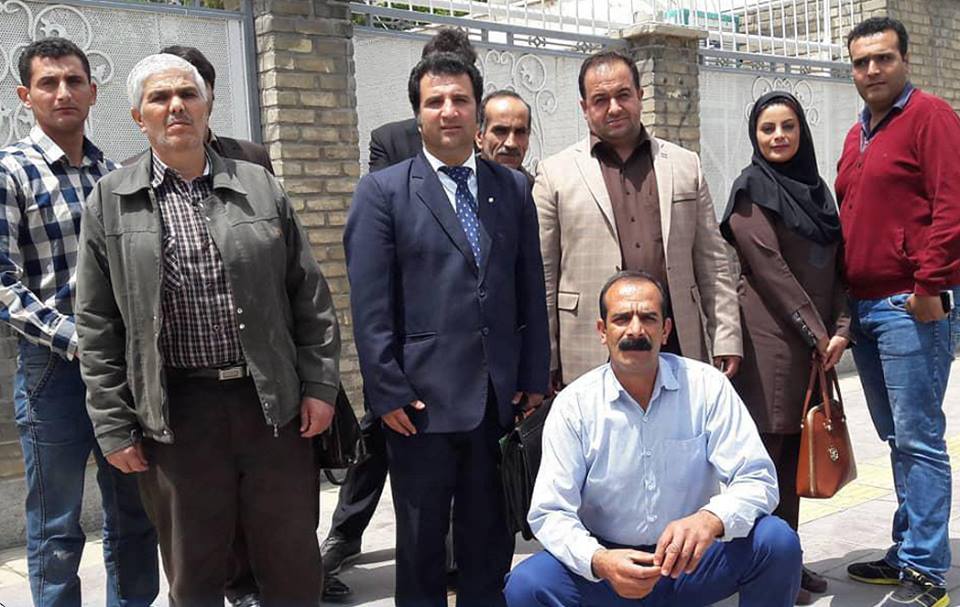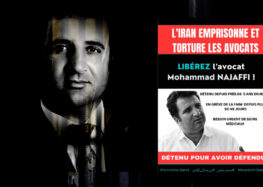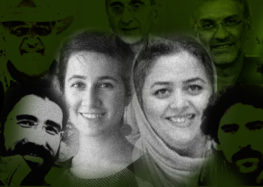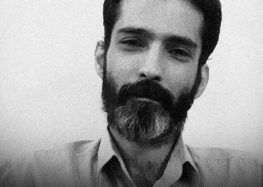Lawyer Who Sought Justice for Death of Detainee in Iranian Custody Sentenced to Three Years, 74 Lashes

Human rights lawyer Mohammad Najafi (center in a blue suit) poses for a photo with some of his clients and colleagues at an unknown location in the city of Arak. Najafi has been sentenced to three years in prison and 74 lashes for accusing local police of killing a young man who was taken into custody earlier this year. No one has been held responsible for the death of the detainee, 22-year-old Vahid Heydari.
10 Other Individuals Also Sentenced in Mass Trial
Less than a year ago, attorney Mohammad Najafi was advocating for a young client who died under suspicious circumstances in an Iranian detention center. Nine months later, he has been sentenced to three years in prison and 74 lashes for the charges of “disturbing the state” and “publishing falsehoods.”
“The rulings against me, Ali Bagheri and Abbas Safari were upheld [by the Appeals Court] without any changes: One year and 74 lashes for ‘disturbing the state,’ and two years for ‘publishing falsehoods,’” Najafi wrote in a Facebook post on October 18, 2018.
“The sentences against the other defendants, including six of my clients, were suspended for five years,” he added.
Najafi and Safari began their prison sentences in Arak’s Central Prison on October 28.
In January 2018, Najafi informed media outlets about the suspicious case of Vahid Heydari, 22, who died in detention at the 12th Police Station in Arak sometime between the end of December 2017 and the beginning of January 2018.
Najafi told media outlets at the time that the authorities were trying to cover up the real reason for Heydari’s death by claiming he had committed suicide. Iranian authorities have claimed at least two other detainees “committed suicide” in custody in 2018: Iranian Canadian environmentalist Kavous Seyed-Emami and Sina Ghanbari.
Iran’s State Prisons Organization and the judiciary are responsible for ensuring the safety and well being of all detainees held in state custody but no one has been investigated or held responsible for these deaths. Instead, Iran’s judiciary has worked to silence those who have sought justice for the victims, including activists and human rights lawyers.
Eight other defendants who were tried at the same time as Najafi, Bagheri and Safari were also issued sentences including prison time and flogging.
The United Nations has declared flogging a cruel and inhumane punishment tantamount to torture. But over 100 flogging sentences were issued in Iran in 2017, with at least 50 reportedly implemented, according to the UN.
Judge Ghasem Abdollahi of the Appeals Court in Markazi Province upheld the three-year prison sentences/74 lashes for Najafi and activists Ali Bagheri and Abbas Safari.
Those who received suspended sentences are Kian Sadeghi, who received three years in prison and 74 lashes, and Mohammad Torabi, Mohammad Yaghoubi, Yousef Shiri, Behzad Alibakhshi, Masoud Ajlou, Davoud Rahimi and Neda Yousefi, who were sentenced to one year in prison and 74 lashes.
Judge Punishes Defendants For Advocating Human Rights
According to Najafi’s Facebook post, the indictment said that all 11 had been arrested in early 2018 for allegedly joining protests in the city of Arak in December 2017/January 2018 against state policies.
Iran’s judiciary has a documented history of bowing to pressure by the arresting authorities in cases involving political issues. In this case, the appeals court judge blamed the detainees for allegedly speaking out about human rights issues in the country, claiming they are responsible for renewed US sanctions on Iran.
“How can a person claim to be helping society and at the same time work in unison with opponents of the state and sworn enemies of the Iranian people by providing false reports and lying about things like the death of Vahid Heydari by the hands of the police, which become reasons for imposing economic pressure on the Iranian people,” Judge Abdollahi wrote in his decision.
“The dominant world powers are using human rights, etc., as excuses to eliminate and destroy the honorable and vigilant Iranian people and their civilization rooted in thousands of years of divine revelations, with Islam being most advanced of all,” he added.
Judge Abdollahi and the prosecutor in the case provided no evidence that the detainees worked “with opponents of the state.”
It remains unknown exactly how Heydari died in the Arak Detention Center. His family has meanwhile been pressured to avoid speaking to media outlets.
“I have been a lawyer and writer for years and during this time I have been repeatedly charged and acquitted,” said Najafi in May 2018. “The authorities themselves have told me that they are trying to grind me into oblivion.”






